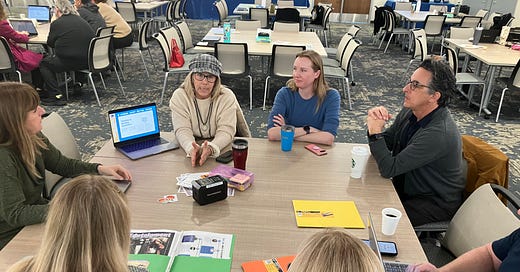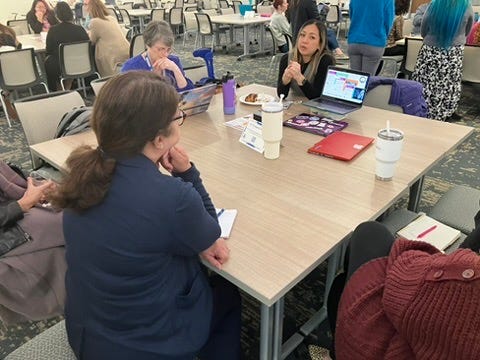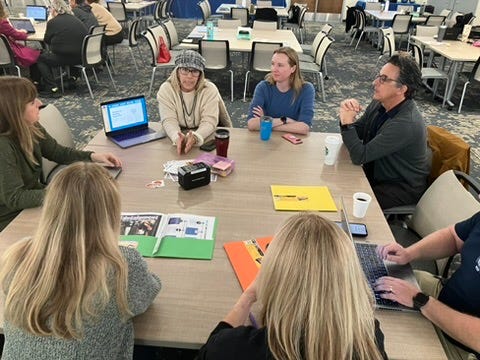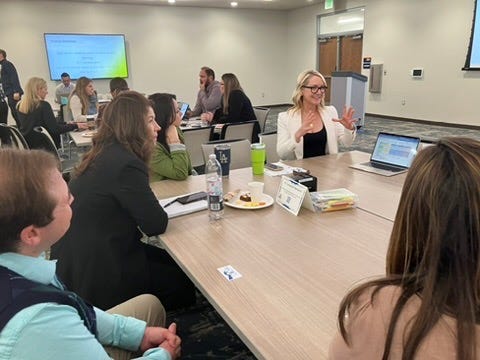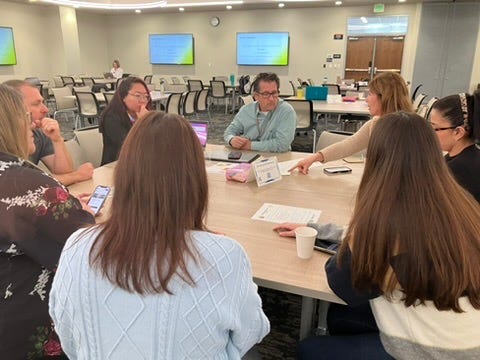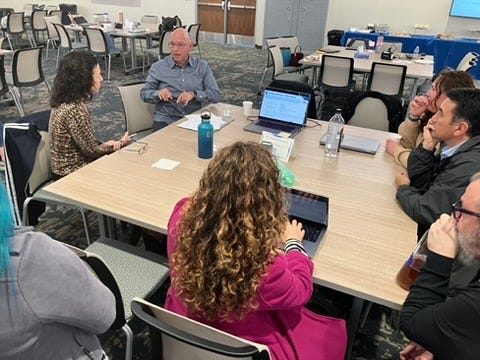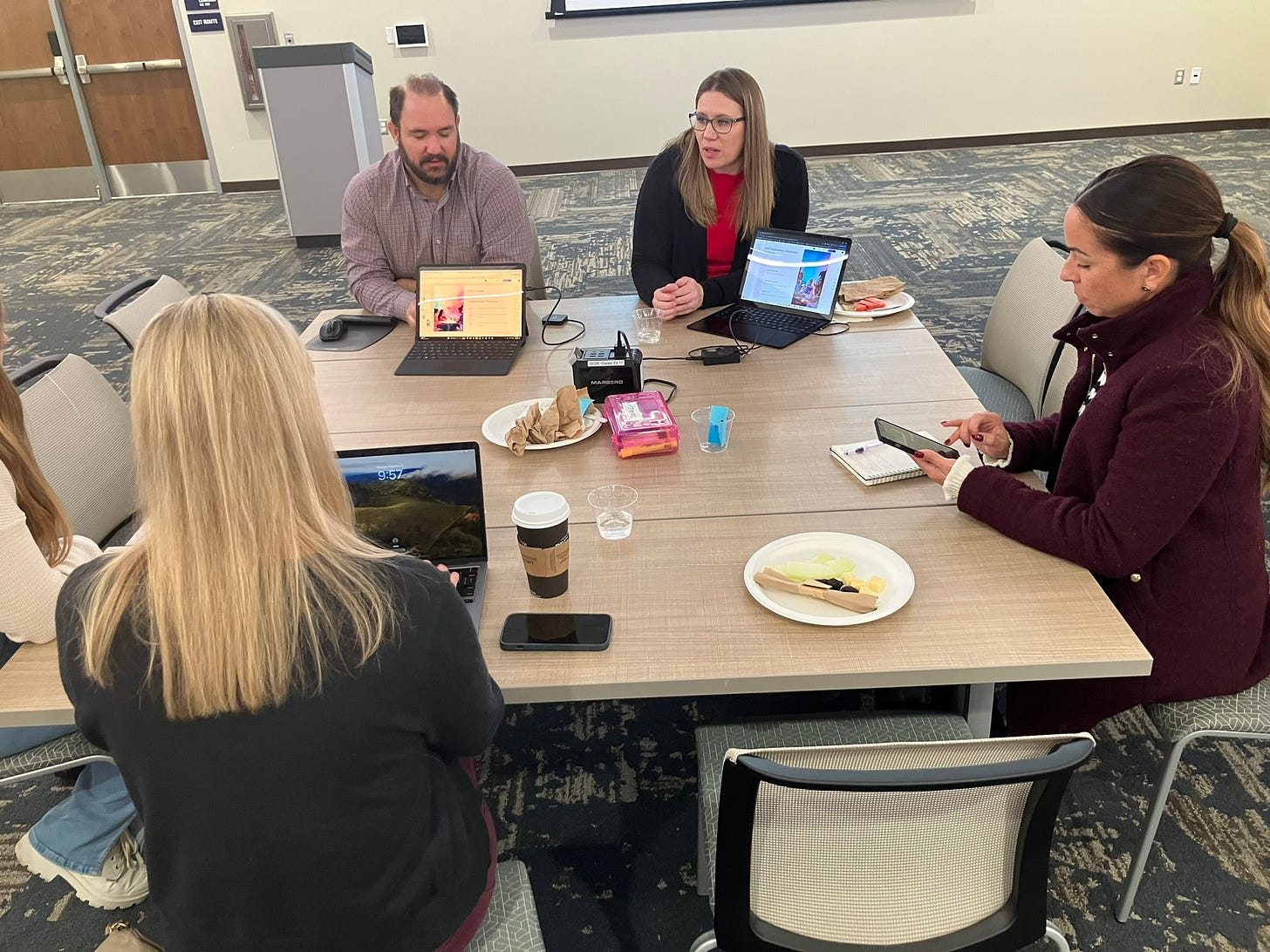Sincerely Yours, The AI Club
Picture this: Five students—each with distinct backgrounds, challenges, and strengths—walk into a library. By the end of the day, they’re not just individuals; they’re collaborators, thinkers, and unlikely allies. That’s the magic of The Breakfast Club. Fast-forward to 2025, and Orange County’s school districts are writing their own version of this story. Substitute “students” for districts—Newport-Mesa, Westminster, Santa Ana, and more—each with unique challenges, yet united in a shared mission: to harness AI not as a replacement for human ingenuity, but as a partner in problem-solving.
“When you grow up, your heart dies,” Ally Sheedy’s character laments in the film. But here’s the twist: AI isn’t here to automate our humanity—it’s here to amplify it. From LCAP “thought partners” to cross-district strategy sessions, OC educators are proving that when you pair 80s-era collaboration with 21st-century tools, you don’t just survive the school day… you redefine it.
This isn’t just about technology—it’s about people. It’s about educators, administrators, and students coming together to solve problems, share insights, and build a future where AI enhances, rather than replaces, the human touch. Let’s dive into how Orange County is making this vision a reality.
Part 1: AI-Powered LCAP Support: Exploring AI for Smarter Decision-Making
Scenario 1: NotebookLM – Rethinking Differentiated Assistance (DA) with AI as a Thought Partner
How We Could Use It:
As we look for ways to enhance Differentiated Assistance (DA) meetings, we are considering how AI might support districts in capturing and analyzing discussions about student data, challenges, and root causes. Traditional note-taking has been inconsistent, often making it difficult to track evolving insights across multiple sessions.
With NotebookLM, we could transform how districts engage with their own reflections:
AI-Organized Notes in Real Time: Instead of manually tracking notes, teams might upload transcripts of discussions, allowing AI to categorize insights based on key themes like absenteeism, suspensions, and equity.
A Running Knowledge Base: AI could reference past discussions, ensuring districts retain valuable takeaways across meetings.
AI-Driven Reflection & Strategy: Districts might ask, "What patterns are emerging?" or "What were the most significant challenges discussed?"—and receive AI-generated summaries that deepen their analysis.
Why It Matters:
NotebookLM could serve as a thought partner, helping teams make sense of their discussions while reducing administrative burden. By removing the pressure of manual documentation, districts might focus more on strategic problem-solving and collaborative decision-making.
Scenario 2: Chipp – AI Chatbots for LCAP Scoring & District Guidance
How We Are Planning to Use It:
We are actively prototyping two custom Chipp chatbots to streamline LCAP support:
Internal LCAP Scoring Calibration (For County Review Teams):
Analyzes district-submitted LCAPs against CDE-approved templates, instructions, and our scoring rubric.
Flags missing components and provides structured justifications for any gaps.
Supports reviewers in calibrating their evaluations, ensuring more objective and aligned scoring.
District-Facing LCAP Plan Feedback (For District Leaders):
Upload their LCAP draft and receive instant AI feedback on missing elements.
Ask questions like, "How do I address increasing staff with concentration grant funding?"
Access resources such as CDE webinars, county office guidance, and best practice models pre-loaded into the chatbot.
Why It Works:
By embedding institutional knowledge into an easy-to-use AI tool, we are empowering districts to refine their LCAPs before submission—reducing back-and-forth corrections. At the same time, our review teams are leveraging AI to create a structured, data-driven approach that enhances accuracy and efficiency.
AI-Driven Efficiency for LCAP Support
By exploring NotebookLM as a thought partner for DA meetings and actively building Chipp for real-time LCAP analysis, we are working toward streamlining district collaboration and internal review processes. These AI-powered tools are allowing us to spend less time on administrative tasks and more time providing meaningful support to our districts.
Interested in learning more? Let’s talk about how these AI solutions can support your district’s planning process.
Part 2: Districts Explore AI Integration Through Reflection and Cross-Pollination
At our February OC AI Forward network meeting, Orange County districts came together for a unique session focused on developing thoughtful AI integration practices, sparked by recent developments in the AI landscape.
Opening Reflection: A Week of Rapid Change
The session began with districts reflecting on the fast-moving AI landscape, examining recent events from DeepSeek's impact to OpenAI's responses, using this context to ground our discussions about responsible AI implementation.
Collaborative Learning Through Station Rotations
More than twenty districts attended and heard from leaders from eight districts sharing their work around AI Fluency; Newport-Mesa, Westminster, Orange, Saddleback, Tustin, Santa Ana, Fullerton Elementary and Capistrano participated in a station rotation model, showcasing their work including:
Current AI initiatives and early learnings
Implementation challenges and successes
Progress on guidance and policy development
Lana Nguyen, edtech director/Capo Unified
Jenith Mishne, edtech director/Newport-Mesa Unified
Dr. Brandee Ramirez, AI TOSA/Saddleback Valley Unified
Randy Kolset, Administrator of Educational Technology & Apple Abrica, TOSA of Educational Technology, Orange Unified
Gerardo Martinez, edtech director/Westminster
Julie Young, edtech coordinator & Derek Johnson, Ed Tech TOSA/Tustin Unified
Pablo Diaz, edtech director/Fullerton Elementary
Mapping AI Habits
Using an efficacy-frequency matrix, districts evaluated key AI integration practices, examining habits like:
Seeking input from multiple stakeholders
Using AI to enhance rather than replace human interaction
Setting clear guidelines for appropriate AI use in learning environments
Critically evaluating AI-generated content for reliability and accuracy
Looking Forward
The session concluded with details about upcoming opportunities:
AI K12 Deeper Learning Summit (Feb 27-Mar 1, Anaheim)
OC CUE TechFest (March 8, Stacey Middle School, HB)
ASU GSV The Show (April 5-7, San Diego)
Districts will reconvene next month for more learning and sharing around safe and effective approaches to build AI Fluency. Those interested in joining future AI Network meetings can contact the OCDE team for more information.
Closing Paragraph to Tie It All Together:
Just like the students in The Breakfast Club, Orange County’s districts are breaking down barriers and finding common ground—not in a library, but in the shared pursuit of innovation. By embracing AI as a tool for collaboration and reflection, they’re proving that the future of education isn’t about technology replacing humanity—it’s about technology empowering us to be more human. Together, we’re not just surviving the school day; we’re redefining it.

